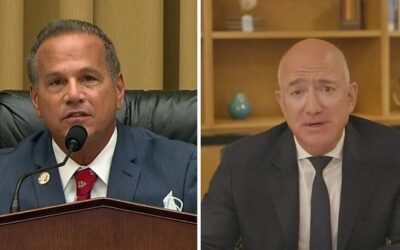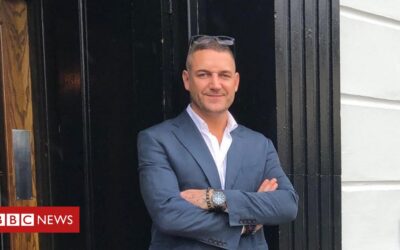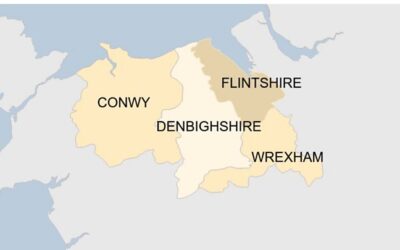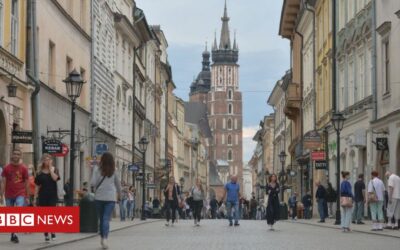Playboy Enterprises is going to list again on the stock market, nine years after it was taken private.The late Hugh Hefner empire is merging with another firm, Mountain Crest, in a deal that values Playboy at $381m (£296m) and includes $142m of debt. Playboy has transformed its business model and stopped printing its famous magazine earlier this year.It now describes itself as a consumer products company that includes sexual wellness, clothing and gaming.The magazine was first published in 1953 but shut it down as it struggled to compete with online rivals.It now puts its famous bunny logo on products such as lingerie, digital gaming and grooming.Playboy says it has $3bn in consumer spending against the Playboy brand across 180 countries. “Playboy’s foray indicates the pivotal value of branding,” Nirgunan Tiruchelvam, Head of Consumer Sector Equity Research at analyst firm Tellimer told the BBC. “Magazine publishing is a sunset business, but Playboy has transformed its business model.” Long historyHugh Hefner founded Playboy Enterprises in 1953. The company’s first magazine in December that year featured Marilyn Monroe on the cover. Its nude images catapulted the company to fame and the print magazine became the centrepiece of its business for decades.But as the digital age took hold, sales declined and it moved into other ventures, such as collaborations with fashion brands such as Marc Jacobs. Mr Hefner died in 2017 aged 91 and his family sold its 35% stake to a tech-focused investment fund the following year.Playboy still publishes articles and pictorials online.Blank chequeThe merger with Mountain Crest is expected to be finalised in early 2021 and then the new firm will list on the Nasdaq, the US stock market index that contains tech heavyweights such as Apple, Amazon and Google’s parent company Alphabet.Mountain Crest is a special purpose acquisition company (SPAC), often referred to as a “blank cheque company”.These companies are set up with the sole purpose of buying a private firm to merge with and then take public on the stock market. It is seen as a faster route to the public markets with less scrutiny.SPACs have raised close to $41bn so far this year, four times the amount raised by this time in 2019, according to data provider Refinitiv. “The intention was always to return the company to public markets,” said Playboy chief executive Ben Kohn. He added Playboy was already planning to make acquisitions.
BBC Business News Articles
Nearly 20,000 Covid-19 cases among Amazon workers
Amazon said that more than 19,816 of its frontline workers in the US have contracted Covid-19 since March. The number equates to 1.44% of its 1.37 million workers across Amazon and its subsidiary Whole Foods. Amazon had faced criticism from employees, unions and elected officials, who have accused the company of putting employees’ health at risk. But the online retailing giant said its infection rate is lower than expected. Amazon has kept its facilities open throughout the pandemic to meet a surge in demand from shoppers stuck at home. Staying open has proven very lucrative for the e-commerce firm, and has added to the wealth of founder Jeff Bezos, who is the world’s richest man. The tech giant’s sales soared 40% to $88.9bn (£67.9bn) in the three months ending in June, and its quarterly profit of $5.2bn (£4bn) was its biggest since the company started in 1994.Low infectionsIn a blog post, Amazon argued that 33,952 workers would have contracted the virus if Amazon’s infection rate had equalled the wider population’s, when accounting for employees’ age and geography.The figures include seasonal staff and those who may have been infected outside work.Amazon warehouse robots ‘increase staff injuries’
Amazon One: Palm scanner launched for ‘secure’ payments
The company said that it “introduced or changed over 150 processes”, distributed more than 100 million face masks, and implemented temperature checks at its facilities around the world. Amazon said it introduced social distancing measures and additional cleaning, which “occurs across each site about every 90 minutes”.
Media playback is unsupported on your device
Amazon challenged other companies to make public their own Covid-19 statistics. “This information would be more powerful if there were similar data from other major employers to compare it to,” Amazon said in the blog post.Athena, a coalition that has opposed Amazon on a wide range of labour, planning and environmental issues, called on officials to investigate further. “Amazon allowed Covid-19 to spread like wildfire,” Athena’s director Dania Rajendra said in a statement.
Singapore firm pushes ahead with Newcastle United bid
Singaporean-backed firm Bellagraph Nova says it is pushing ahead with its bid for Newcastle United Football Club. One of the firm’s co-founders Evangeline Shen told the BBC her team is in regular contact with the Premier League club. Bellagraph Nova has been the subject of a number of revelations since its bid was revealed in August. The company has been criticised for inconsistencies about its assets and has retracted press statements.Bellagraph Nova particularly came under fire for a photo-shopped picture of its three founders meeting former US President Barack Obama. Revelations about the group have been covered extensively by Singaporean media.Ms Shen co-founded Bellagraph Nova with business partners and cousins Nelson Loh and Terence Loh. All three are directors of the Paris-based group.The newly-merged group is a complex network of companies spread across consumer goods, luxury products and healthcare. Newcastle bidIn an exclusive interview Ms Shen told the BBC that “bidding for Newcastle is part of our strategy because it’s a well-known football club but still has room to improve, and we believe that improvement is good for the club as well as for our brand”. “We started real planning for the club such as whom to hire as trainer and whom to sign for players,” she added. The 128-year-old football club is owned by billionaire retailer Mike Ashley, who put it up for sale in 2017. A £300m bid put forward by Saudi Arabia’s Private Investment Fund fell apart in August due to protracted negotiations. Bellagraph Nova then stepped in with a £280m offer but has since become mired in controversy.But Ms Chen is confident about the pursuit of Newcastle United. “We are always in contact and we are still very aggressive on trying to close the deal. “I can tell you our team just met Mike Ashley’s representative last week on the process in Paris again.”Out of nowhereOn its corporate website, Bellagraph Nova says it has 23,000 employees and revenues for 2019 of $12bn (£9.3bn). Singapore-based corporate governance expert Mak Yuen Teen said it is not unusual for some companies to exaggerate their credentials or “window-dress”. “I’ve seen listed companies continually misrepresent themselves including on the Singapore Exchange – announcing deals that are false, using fake degrees, but this is at a whole new level,” he said. As Bellagraph Nova and its entities are not publicly listed on any stock exchanges, apart from one linked company called Axington, their claims about revenues and employees cannot be easily verified. “It’s quite unbelievable that a $12bn company with 23,000 employees appear out of nowhere. Most likely they are claiming potential partners as part of their business,” added Mr Yuen, who is an associate professor of accounting at the National University of Singapore.Talking about the revenue and employee figures, Ms Shen said “the calculation we have is a generic one because we can only base on what our partner firms and our subsidiaries tell us to consolidate”.”I understand the numbers may look large, but as the nature of online business, it’s very normal to have a lot of employees,” she added.Failed bid?Observers remain sceptical about Bellagraph Nova’s ambitions. “The bid has turned into a shambles for the bidders and appears dead in the water,” said Kevin McCullagh, senior analyst, Asia at SportBusiness. “Football clubs have always attracted colourful investors and owners, often drawn by the allure of a high-profile asset and the status it can bring, rather than a business case,” added Mr McCullagh. In recent years, there has been increasing interest in British football clubs from Asian investors.English Premier League’s Wolves football club was bought by Chinese leisure group Fosun while rival Leicester City is owned by Thailand’s King Power travel retail group.Newcastle United Football Club declined to comment on the bid when approached by the BBC.
Driverless taxis now for hire in Shanghai
Driverless taxis are now available to the public in China’s biggest city. A company backed by the online tech and retail giant Alibaba has started offering a free taxi service – using a fleet of autonomous driving cars – in a small area of Shanghai. It’s one of numerous trials, of various vehicles, across the world. Robin Brant took a ride.Produced by Ed Lawrence
Telford: The town needing a Brexit deal more than most
By Sophie MaddenBBC News, West MidlandsRelated TopicsBrexitimage copyrightMatt AustinFrom meringue makers to manufacturing businesses, firms in Telford export a higher proportion of their wares to the EU than their counterparts in any other town or city in the UK. How do bosses feel as Britain heads towards a decision on a deal – or no deal?Leanne and Brian Crowther have come a long way since the days of running their cake and bakery business in their garden shed, separating eggs by hand for treats destined for a Shropshire market stall.Now Flower and White, known for its gourmet meringues, exports to 12 countries, many in the EU, and employs 35 staff at its headquarters in Telford – producing a million meringues a day.But the global success has meant the firm has endured years of uncertainty over whether the government will strike a Brexit deal – and that was before trade was hit by the coronavirus pandemic.”We have seen export business fall by 85%, so I think a lot of it is to do with Covid, but also everyone is now just sitting tight. Some customers have been brave enough to order but the orders have been smaller than we expect,” said Mrs Crowther. Sales to Switzerland, Denmark and Germany continued to do well, she added, but orders to other countries have dried up amid the uncertainty caused by the pandemic and a looming Brexit date.”It is really tricky to plan. We don’t have the time, in the amount of time that is left, to be organised enough to deal with a no deal. As usual, we just have to get on with it.”image copyrightFlower and WhiteIt is a feeling shared by many business owners in Telford. Figures from the Centre for Cities think tank have shown it to be the UK town with the largest share of its exports going to the EU, about 70%. All eyes, then, are on the government to sign a deal by by 15 October.”There will be no winners from a failure to secure a trade deal with the EU as it is the most important customer for every city and large town in Britain,” Centre for Cities’ Director of Policy and Research Paul Swinney said.”For Telford, the failure to sign a comprehensive trade deal covering both goods and services would be very damaging to the local economy.”The Ironbridge Gorge, within Telford, is renowned as the birthplace of the Industrial Revolution as it was where Abraham Darby discovered a more effective method of smelting iron, which transformed the way the metal was used and led the way for an industrialised world. image copyrightGavin DicksonTim Luft, from the Telford Business Board, said this tradition of manufacturing was part of why exports in Telford were so high. “Telford has a lot of manufacturing – a lot of companies working in the supply chain of automotive and aerospace – and in that supply chain a lot of those link into Europe.”So I absolutely imagine why Telford is such an important town and why companies need to be aware of Brexit for when they are looking to supply goods into Europe or really bring services back into the UK,” he said.One such manufacturer is Hitherbest, which fabricates sheet metal parts for retail, office, hospitality, rail, museum and education sectors.It is owned by Dr Nicky Evans, whose father Chris set up the business in 1985. She said an ethos of “prioritising steady long-term growth” meant her company had so far survived 2020 while some others could not.”In so far as Brexit goes, the primary concern for us is our supply chain, but we have done some due diligence there and are relatively confident we should be able to continue in the event of a no-deal Brexit,” she said.The company has seen a “push” by companies based in the UK that have previously sourced parts from Europe but were now looking for ways to purchase what they needed domestically, to avoid any supply chain problems once Brexit has taken place, Dr Evans added. “I think we’re firmly in wait and see mode, we are confident if there is a shock, we will be able to absorb it and we’ll have a look, sort-of, middle of next year and see where we are,” she said.”From what I’ve seen, the manufacturing sector in the West Midlands is resilient, agile and innovative. It may be a rocky road at times, but I’m optimistic for the future.”The British Chambers of Commerce claimed only half of UK firms that traded internationally had considered the impact of Brexit on their business ahead of the end of the Brexit transition period on 1 January 2021.Jonathan Ritson runs Dyson Ritson Consulting, a Telford-based business consultancy firm, and has been working with companies to help them prepare for leaving the EU.He said Telford was a “diverse economic community”.”My understanding of things as they are is that the bigger businesses, the ones with more economic clout, the ones that have already got international bases, are going to be better prepared than the small to medium businesses,” he said.”Businesses have just been focusing on surviving during the pandemic and are only just now, if at all, being able to turn their attention to issue of Brexit.”That has been the case for Derek Tallent, director of sound and lighting company Press Red Rentals, who said business had been “pretty tough” because of the shutting of the exhibition industry this year. He said he was not sure what the future would hold.”Having gone through the ‘we hate Brexit, we don’t want it to happen’ to ‘actually it’s happened and we’re coming towards the end of the transition period’, you just have to bite the bullet and get on with it,” he said.”I would like us to stay in the single market and the customs union but that’s obviously not going to happen – but it would be nice for them to get a good trade deal.”The re-emergence of exhibitions in Europe was a good sign, he said, provided a deal – or no deal – allowed the firm to be involved.”The worst thing will be if we can’t work. If we can’t get permits for trucks, if we can’t get work visas,” he said.Flower and White has already begun to manage the issues posed by leaving the EU, signing a three-year deal with a US importer and has been focusing on any positive opportunities that could come from the next year.Leanne Crowther said while uncertainty was a pain, she could not change it and it would do no good to sit around worrying about what was coming.”I believe small businesses will respond the best to this situation, because you have to – you are used to grasping, but that doesn’t make it desirable by any stretch of the imagination,” she said.”We have to dig our heels in and get on with it, what else can we do? We can’t lie down.”Follow BBC West Midlands on Facebook, Twitter and Instagram. Send your story ideas to: [email protected] Related TopicsMore on this story
Should you be buying a second-hand smartphone?
French entrepreneur, Thibaud Hug de Larauze, looks down at his laptop and taps a few keys.”So today we have 200,000-plus smartphones available to sell,” he tells me.None of those smartphones are new, instead they have been refurbished, a process involving checks, repairs and cleaning.Once the phones meet the required standard they can then be sold with a one-year warranty on his company’s website, Back Market, which operates in European countries plus the US.Based in France, Back Market sells electronics across Europe and the United States. While smartphones are the big sellers, his website lists everything from coffee makers, laptops, to irons.Formed six years ago by Mr Hug de Larauze and two partners, Back Market does not refurbish the products itself, instead it provides a marketplace for hundreds of other firms to sell their used goods. It is one of many firms riding the wave of growth in refurbished electronics. Last year, around 137 million used smartphones were sold in the US and Europe, according to Counterpoint Research.Jeff Fieldhack, the head of research at research at Counterpoint, says that sales of used smartphones now account for about 10% of all smartphone sales.So what’s the attraction of owning a second-hand phone that’s a few years old? Why not buy a cheaper brand new device? It all hinges on the so-called flagship phones from Samsung, Huawei and, in particular, Apple.Bought new these top of the range devices can be wildly expensive – Apple’s top end iPhones will set you back more than £1,000.But within months of their launch they will start appearing on second-hand marketplaces with perhaps a 15% discount and after just two years the discount will be a healthy 50%.”A flagship device from three, four years ago, from iPhone is still a better quality device, than something new in the $200 to $300 range,” Mr Fieldhack says.A decade ago, used phones would typically be sold on marketplaces like eBay. It was hard for buyers to know the quality of the device they were buying and they would be unlikely to get a warranty.Now firms that sell refurbished electronics go to great lengths to reassure their buyers. In fact those in the industry would draw clear a line between phones that have been used and those that have been professionally refurbished.”We want you to have exactly the same shopping experience that you would have in the Apple Store or PC World – ideally better,” says Jeff Godfrey, the founder of Tech.Trade, based in South Wales.His main product is refurbished computers. “If you buy something and change your mind and want to send it back, yeah, send it back,” he says.The main problem he has is getting supplies of used computers. Most of his used machines come from people who are trading in machines they don’t want anymore, but there’s not enough of them.Mr Godfrey sold around 15,000 products last year, and could double that this year if he could get more products. “We’re just starting to get to the point where we’re dangerously low on stock,” he says.That’s mainly due to the surge in demand from people working from home during the pandemic – in May Mr Godfrey saw sales surge 35%, compared to the previous year.The second big challenge is replacement parts. Getting hold of screens and batteries can be difficult. Despite the challenges, those in the industry are forecasting bumper times ahead. Mr Hug de Larauze expects the sales of used smartphones to match sales of new devices by 2030.Analyst Jeff Fieldhack thinks that is a bit optimistic. He says that while firms have made big strides in improving quality and service, customers remain cautious, particularly in important markets like China, the Middle East and Eastern Europe.”There’s a lot of apprehension about the secondary market and in many markets the quality issue still needs to be overcome,” he says.Much also hinges on the popularity of Apple products which account for 40% of sales of used smartphones. Many customers would rather own a second-hand Apple phone or computer, than a new one from a different firm.”Apple just is so dominant in the secondary market because they have such brand value and very expensive devices,” says Mr Fieldhack. “These are $800-and-above devices that are sold in the US market for $200. That is a very attractive value proposition for consumers who are priced out of iPhones but want to get in that [Apple] ecosystem.”While the quality of Apple products makes them desirable in the used market, Apple and other smartphone makers have been criticised for making their devices difficult to repair.”They also make some aspects of refurbishment incredibly challenging by design and by policy,” says Mr Godfrey.There are moves to remedy that situation.In the US, The Repair Association is pushing for legislation that would force firms to release manuals and other information necessary to repair products.And the European Union this year proposed an initiative to promote reusability and reparability.All of that would make life easier for refurbishment firms.In its defence Apple says that making devices more repairable sounds simple, but in reality legislation would be difficult to get right and could result in less durable and bulkier devices. To helper smaller repair firms, in July Apple launched a programme offering training and access to Apple parts.The refurbishment industry also operates in the shadow of huge marketing campaigns from the smartphone industry.Mr Hug de Larauze says massive advertising tells people everyday that what they have in their pocket is too old.He wants consumers to resist those messages, not just because it would be good for his business, but because it benefits the environment as well.”Do you need something new? No, I think not. I think you should maybe consider repair and just keep as long as possible.”
Coronavirus: 'Our ray of hope turned into an oncoming train'
A UK leisure firm has revealed the challenges businesses still face as part of the ongoing Covid-19 outbreak.Rockpoint Leisure, in New Brighton, on Merseyside, employs 150 people, in its a restaurant, pub, barbers-cum-bar, and – most recently – an art gallery.”We thought we had seen the light at the end of the tunnel, but it has turned out to be an oncoming train,” says boss Dan Davies.It comes as the British Chambers of Commerce says UK firms are struggling.’Curfew killing trade’Nearly half of UK companies are seeing sales decrease as they endure a sustained cash crunch, according to the BCC.Its Quarterly Economic Survey found that business conditions remained weak in the third quarter of 2020, despite much of the economy reopening.Businesses serving consumers, including hospitality, and such as those owned by Mr Davies, fared the worst it added.The “oncoming train” Mr Davies refers to is the restriction imposed by the government last month on pub closing times.”The 10pm curfew is killing our trade,” he says.He said bars and restaurants faced a tough financial quarter as they were still having to employ door people and other staff, but their trading hours were being reduced by the latest lockdown curbs, including the new 10pm closing time. “The industry has got a long hard winter coming,” he said. “A lot of businesses in our sector are not going to be open when the new year comes around.” As well as being a BCC member, Mr Davies also sits on the board of regulatory body the Institute of Licensing, and on the board of trade body UK HospitalityHis firm is regenerating the Victorian Quarter of the Wirral seaside town, and owns and runs a number of businesses including a restaurant, pub, barbers-cum-bar, and most recently an art gallery.He said the business environment had been tough since lockdown, with him and his business partners having to plough more of their own money in.”The furlough scheme and Eat Out to Help Out were of benefit to our sector, then the new restrictions were brought in,” he says.Cash flow woesAccording to the BCC, despite improvements in some business indicators compared to earlier in the year, “business conditions remain close to historic lows”. Its survey looked at 6,410 firms, employing more than 580,000 people across the UK, and found: Almost half (46%) of firms reported a decrease in UK sales, with just over a quarter (27%) reporting an increase on the previous quarter
For firms in the services sector – which makes up the bulk of the UK economy – cash flow remains at levels comparable to the 2008-09 recession
Two-thirds (66%) of respondents in hospitality and catering saw decreases in sales and bookings.
While the July-to-September period saw an improvement compared with the second quarter, the majority of firms continued to report decreases or no change in sales during the third quarter.Social distancing restrictionsAdding to the overall gloomy picture, the BCC points out that most of its surveying took place before the prime minister’s announcement in the middle of September that a “second spike” of coronavirus had hit the UK.It says the subsequent introduction of new national restrictions – such as those experienced by Mr Davies – and tightening local restrictions paint a concerning picture for business conditions in the fourth quarter of the year,Suren Thiru, BCC head of economics, said: ”Our latest survey indicates that underlying economic conditions remained exceptionally weak in the third quarter. “The manufacturing sector recorded the strongest improvements in the quarter, while consumer-focused services firms, where social distancing restricts activity, saw more limited gains.”The persistent weakness in cash flow is concerning as it leaves firms more vulnerable to external shocks, including further restrictions.”BCC director general Dr Adam Marshall added: ”Our findings clearly demonstrate that business conditions remain fragile in the face of uncertainty, with the prospect of a difficult winter to come.”
Covid in Wales: Lockdown tourism businesses fear closure
Media playback is unsupported on your device
Businesses across north Wales say they fear local lockdowns could lead to job losses or even closures.New restrictions came into force for Conwy, Denbighshire, Flintshire and Wrexham on Thursday evening.It means those living in these areas cannot leave or enter without a “reasonable excuse” such as work or education.Businesses reliant on tourists said they were facing confusion over the rules and financial uncertainty.The restrictions – the same as those seen in most of south Wales – mean another 500,000 people are now living under tougher restrictions than at the start of September.’Another dark day’Jim Jones of North Wales Tourism questioned whether visitors into north Wales were responsible for the spread – saying he had not seen any evidence they were.”Business are extremely and understandably frustrated, it’s another dark day,” he told BBC Radio Wales Breakfast.”They have invested so much time and gone to extraordinary measures to be Covid-compliant and make everybody safe and then all of a sudden they’ve got to cancel bookings and tell visitors to go home.”Mr Jones called for outbreaks to be “micro-managed” by contact tracers – with local lockdowns covering much smaller areas.”Our businesses are yet again about to be decimated. The lockdowns in north Wales at this moment in time are an overreaction… a knee-jerk reaction.”To decimate the entire tourism and hospitality industry for cases that are still relatively low in the scale of things… Our economy is tourism.”Conwy council leader Sam Rowlands said he was “disappointed and frustrated” the Welsh Government did not take measures to protect tourism which would lose out again.Among those braced for another hit is the SeaQuarium in Rhyl which relies on day trippers and visitors from outside Denbighshire for as much as 90% of its business.”It’s a real struggle,” said director Colette Macdonald.”We were hoping we had a lifeline when we were able to reopen but we’re 40% down on last year and my fear is that we will lose the October school half-term as well.”It’s also very difficult for attractions with animals. We can’t just pull down the shutters and come back six months later.”We have constant bills such as vets, heating and food for the animals. Our electricity bill alone is £5,500 every month – and we are almost entirely reliant upon visitors for revenue.”We’ll have to reduce staff hours and possibly make redundancies if the lockdown continues. It’s tough and very deflating.”Zoos and aquariums in England get special help but in Wales we are regarded as part of the hospitality sector. We need more help from the Welsh Government.”The Welsh Government said: “Earlier this year we wrote to zoos in Wales with details of existing schemes which they may be eligible for funding, as well as issuing a questionnaire to identify key animal welfare concerns and whether any funding gaps exist.”Businesses have also complained the difference between rules in Wales and England over travel for holidays has caused “mass confusion”.First Minister Mark Drakeford has called for Boris Johnson to ban people in locked-down parts of England from travelling to Wales on holiday.”Wales is doing everything possible to safeguard England and I don’t feel England is doing the same for us here in Wales,” was the view of Anglesey council leader Llinos Medi.The owners of Halkyn Castle Wood campsite, near Holywell in Flintshire, rely on visitors from across the border.”The differences in the rules are very confusing,” said Venessa Warrington, 44.”People are ringing and at times we don’t know what to tell them. We’re just going along with the advice given by Visit Wales.”The family-run campsite, like so many businesses in the tourism sector, is facing an uncertain future.”My heart sank when we heard the latest lockdown announcement,” said Mrs Warrington.”It has been a very difficult year. I worked out to the penny how long we could go before we would have to sell the family business. “We’ve extended the season longer than usual to make up for lost months but our financial problems will only get worse if we’re forced to close again.”Founder of the Zipworld attractions Shaun Taylor has put 100 staff on furlough from Thursday evening and said: “It’s challenging. It’s emotionally challenging, it’s financially challenging.”The National Trust said lockdown offered local residents a chance to enjoy its sites across the region, such as Bodnant Gardens, Erddig and Chirk Castle, without bustling crowds. However visitors must still book in advance.”Over the past few months it’s become clear just how much we all need fresh air and open space, so we’re keeping our places open for local residents to get closer to nature and watch the season unfold,” a spokeswoman said.What are the rules?Under the restrictions no-one can leave or enter a lockdown area except for a limited set of reasons, including:to work, if you cannot work from home
to provide care
travelling to education
elite athletic training and competitions
to provide or receive emergency assistance
to meet a legal obligation, and to access or receive public services
to avoid injury or illness or escape a risk of harm
It is permitted to travel through the areas concerned, so motorists can continue to use the A55 to get to or out of Gwynedd and Anglesey.Rules allowing people to meet extended households are suspended, meaning people can only be with their usual household when indoors, including in pubs and restaurants.Other Wales-wide restrictions apply, including the wearing of face masks in shops.Covid-19 case rate changes in north WalesCases per 100,000 people, seven day rolling averageConwy has seen 52 cases per 100,000 people in the latest week, while the equivalent figure for Denbighshire was 43.9. In Flintshire it has risen to 55.7, and Wrexham it is 59.6
Government's own figures at odds with PM's PPE claim
Despite Prime Minister Boris Johnson’s claim that 70% of personal protective equipment (PPE) is to be made in the UK, his government’s own figures suggest the total is likely to be closer to a third. More than 3.5 billion items, including aprons, goggles, facemasks and gloves, have been bought by the government this year to protect NHS and social care staff from the spread of coronavirus. As the virus took hold in the spring, the battle to get hold of protective gear in the face of soaring global demand and disruption to supply chains was likened by experts to the Wild West. In July, it was revealed that £15bn had been allocated by the Treasury to buy such kit – equivalent to about £200 per person. With more than 80% of PPE items initially produced in China, concerns were growing not just about cost but the ability of the UK to be self-sufficient in key equipment. The prime minister sought to reassure over the UK’s preparedness for a second wave when he addressed the nation on Wednesday. He said that by December “we expect 70% of the demand for PPE to be met by UK manufacturers, compared to just 1% before the pandemic”.Contract concernsBut the government’s own PPE strategy, published just the day before, makes clear that this 70% number excludes gloves – which, according to its figures, make up over half of all PPE being distributed.The raw materials used in gloves means that no British supplier has been found. Include gloves, and the total number of items that will be UK-sourced appears to be more like a third. Does the NHS have enough protective gear for winter?
PM’s father pictured in shop without face covering
The government did not respond to a request for comment on the discrepancy.Concerns have previously been raised over contracts that were awarded to some UK companies, particularly during the initial rush. For example, 50 million masks supplied by Ayanda Capital as part of a £252m deal could not be used due to safety concerns. But if the government’s strategy goes to plan, being able to source one in three pieces of equipment domestically by December would still mean marked progress compared to the start of the year. And with 32 billion items in total on order or delivered, the UK is not in danger of running out of vital bits of equipment soon. However, the figures reveal that there may be more work to be done to improve the UK’s resilience in the face of the threat posed by the virus.
Covid: Poland and Turkey added to UK's quarantine list as fines rise
Travellers arriving in the UK from Poland, Turkey and three Caribbean islands will have to self-isolate for 14 days from 04:00 on Saturday.Poland’s infection rate has risen, while the UK government said it removed Turkey over concerns about the way the country reports its data.There will also be tougher fines for those who fail to self-isolate – up to a maximum of £10,000 in England.One airport group says it is a “further blow” to a “struggling” sector.The UK reported a further 6,914 coronavirus cases and 59 deaths on Thursday, and stricter measures have been announced to control a spike in areas of northern England.Announcing the changes to the quarantine list, Transport Secretary Grant Shapps said data from Poland showed that “test positivity has nearly doubled increasing from 3.9% to 5.8% alongside a rapid increase in weekly cases”. Poland is reporting 25.9 coronavirus cases per 100,000 people, up from 15.6.Arrivals from the Caribbean islands of Bonaire, St Eustatius and Saba will also have to quarantine from Saturday, he added.Those countries reported 142.4 new cases per 100,000, unchanged from 142.4 the previous week.Meanwhile, the Scottish Government announced that those arriving from the Portuguese islands of the Azores and Madeira will no longer need to quarantine in Scotland “due to the low number of cases”.Its statement added that it was “clear that case numbers in Turkey have been under-reported”. Turkey’s reported infection rate has dropped to 12.9 cases per 100,000, down from 14.2 in the week prior.It has also been announced that fines for the first offence of failing to self-isolate when required will start at £1,000, before increasing to £2,000, then £4,000 up to a maximum of £10,000 in England. The upper limit for repeat offences was previously £3,200.The increase in fines will come into force from Friday.
Skip Twitter post by @grantshapps
You MUST self-isolate if you enter the UK from a non-exempt country – from tomorrow, we’re increasing the penalties for people who refuse to do so to a maximum of £10,000 for repeat offenders.— Rt Hon Grant Shapps MP (@grantshapps) October 1, 2020
End of Twitter post by @grantshapps
Since the introduction of the travel quarantine regime in the summer, police officers have investigated more than 4,000 alleged breaches of the rules.More than 200 people were found to be ignoring the quarantine requirement, but escaped a fine because they listened to the officer on their doorstep. Overall there were just 38 penalties for breaching holiday quarantine.If you look at the official data coming out of Turkey then it sits comfortably below the UK’s benchmark for applying the quarantine of 20 cases for every 100,000 people. But revelations that the number of cases in Turkey has been under-reported has put the country onto the “red” list.Turkey and Poland are key destinations for airlines and airports so it’s another blow for the travel sector. The Department for Transport is still looking at whether testing can be used at airports to reduce the quarantine period from 14 to seven days. It is almost impossible for the police to enforce quarantine rules so it is hoped heavier fines for repeat offenders will mean fewer people will break the rules. ‘Massive blow’The Manchester Airports Group, which owns and operates Manchester, London Stansted and East Midlands airports, said Poland and Turkey’s removal from the travel safe list “means that a large proportion of the markets our passengers usually travel to are now effectively closed-off, despite many of them having much lower infection rates than the UK”.The announcement “is a further blow to the already struggling aviation sector”, a statement said.The group said it was “vital” for the government to establish a testing regime “which would allow for a safe reduction in quarantine periods for passengers arriving from abroad”.The Association of British Travel Agents (ABTA) also said it was a “massive blow for the travel industry”.”This coupled with popular winter-sun destinations, like the Canary Islands – still on the quarantine list – only piles the pressure on a struggling sector,” the travel industry trade body said.”Many travel businesses are in precarious position and will find it difficult to survive unless the government acts now with tailored support to assist the travel industry.”Tomasz Lis, who lives in London after moving to the UK from Poland 23 years ago, runs a travel company offering tailored trips to his home country. He says the new rule will cost him thousands of pounds.The 43-year-old said: “It’s been an impossible year already and the government would do much better by checking temperatures at the airports, for instance, and test people who may have it rather than introduce those absurd rules.”Mr Lis is also a concert pianist and has cancelled a performance in Poland on Sunday because of the rules, meaning he will lose £3,000 and the cost of his flights.










